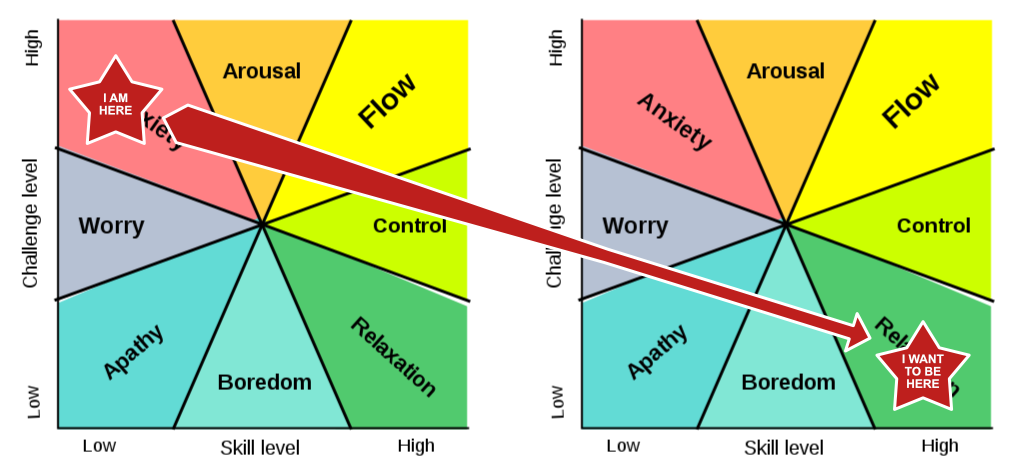My friend Mina has a mood ring that I am enameled enamored with… technically, it’s not a ring, it’s a pin that she got off of Kickstarter. A simple circular pin with five emotions (Tired, Functioning, All Good, Apathetic, Happy!) and a spinning arrow labelled “Today”.
Today I am… pic.twitter.com/nTb9FDl2Zg
— Mina Markham 🧁 (@MinaMarkham) March 26, 2020
Regularly assessing your mental health baseline strikes me as emotional maturity. Mina told me she uses her pin to broadcast her mood to coworkers, a kind of talisman against unnecessary conversations! That’s wonderfully proactive as I acknowledge my underlying emotional state often isn’t clear until after my bloodrage has subsided. My coworkers would probably appreciate an internal status check to temper myself before arguing about fonts or subnavigations or whatever is on the day’s agenda.
Seeing Mina’s pin brought me insight into my own emotional state and how I’ve been functioning under the “new normal” because it reminded me of this diagram:

This is Mihály Csíkszentmihályi’s diagram of Flow, a mental state in which “a person performing an activity is fully immersed in a feeling of energized focus, full involvement, and enjoyment in the process of the activity.” I first learned about Flow nearly 20 years ago studying Japanese biker gangs in college. The concept has since been co-opted a bit by startup culture, in fact in a book I’m reading, Clive Thompson explicitly links flow state to programming in his book Coders. I can recognize my own addiction to being “in the zone”, feeling productive.
But it’s hard to be productive in terrible times. Eric Meyer sums it up nicely:
[I]f you’re having trouble focusing on work, or anything else, it’s not that you’re terrible at working from home or bad at your job. It’s that you’re doing this in a set of circumstances completely unprecedented in our lifetimes.
My internal mood pin arrow is firmly pointing at the “Anxiety” and “Worry” octants as my wife and I self-isolate with young children. We’ve assumed new burdens such as homeschooling and safely getting groceries. “Energized focus, full involvement, and enjoyment in the process” aren’t even on my radar. I feel like I’m just getting by. I would trade heaven and earth for even a few minutes a day in that green “Relaxation” zone.
One thing that isn’t fully self-explanatory from looking at the diagram, as Csíkszentmihályi explains, it’s possible to adjust your state (or your biker gang’s state) by adjusting either the Challenge Level or the relative Skill Level. Playing with those two levers allow you to slide diagonally along the axes and across adjacent boundaries. For me, this offers an explanation of the type of work I’ve been gravitating towards as well as the tasks that have brought me struggle.

Keeping it low-challenge, high-skill
For the last month I’ve found myself subconsciously jumping on “easier” tickets where I feel a high level of expertise (CSS tasks, layouts, prototypes) and I’ve struggled to get through tickets that have a high learning curve or cognitive load. Those deep work tasks are hard to sustain when reality, in the form of kids or breaking news, comes crashing through my door. That’s where the broader concept of Flow is helping me. If I understand the psychology correctly, lowering the challenge level raises my relative level of skill and that gives me a sense of control in an otherwise uncontrollable world. I’m able to move fast and not break things.
I think this is part of the reason the video game Animal Crossing is so popular right now. Video games offer an escape by giving a series of low-challenge tasks that in turn fosters relaxation and control in a sea of worry. During my evenings, I’ve been solving murder mysteries by solving puzzles. Low-challenge, high-skill. Whereas my high-skill, high-challenge multiplayer shoot-em-up games are fun, but a little uninspired. I tend to play the arcade modes there to lower the challenge level.
Lara Hogan talks about being patient with decreased productivity in terrible times. I think that’s a good message for managers of teams, but also a good message for yourself. Depending on your situation, work still needs to happen… but it’s going to look different. Your core needs are different. Don’t feel pressure to be an ultra-productive hustle-maniac, even though some may cope that way.
This is a long-winded way to say, it helps me occupationally and emotionally to focus and prioritize these low-challenge, high-skill tasks. Sometimes that low-challenge work can snowball into more productive work. But often… that’s all I can do in a day. Acknowledging certain work is more suitable for me than other types of work is helping me not feel like I’m falling behind. Your path and circumstances are most certainly different than mine, but maybe this helps you get “in the zone” that’s right for you.